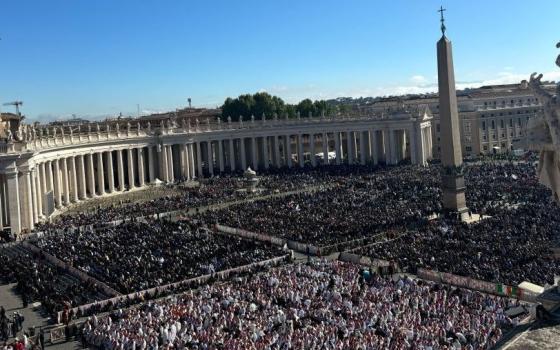One of the elderly sisters in my religious community used to ask a younger sister that question every day at breakfast. The senior in question didn't have dementia. She was challenging the other to dig deeper into her own identity, to discover and articulate who she really was. The younger one started with her name and went on to other words which described the relationships that called her forth: sister, daughter, friend, etc. Some answers had an overtly religious tone while others could include such varied roles as a swimmer and a Cardinals fan. As the days went on, it became quite a challenge to continue to respond with new, honest, creative answers -- and a good number of us learned from watching the interchange.
 Part of the challenge we all picked up on is that you have to be capable of demonstrating the truth of any word you use to describe yourself. If you say you are a tennis player, you'd better at least know which end of the racket to pick up. Today, if you followed Paul's lead and said, "I am member of the church," what evidence could you offer for that claim? Most of us were baptized as infants, and while we may have a certificate, legal as it may be, it's pretty flimsy evidence. In the Book of Genesis, the first question God asked humanity was "Where are you?" Like a pair of naughty children, Adam and Eve admitted they were hiding. From that moment on, God has continued to seek us out, sending prophets, trying to entice us into a covenant of love.
Part of the challenge we all picked up on is that you have to be capable of demonstrating the truth of any word you use to describe yourself. If you say you are a tennis player, you'd better at least know which end of the racket to pick up. Today, if you followed Paul's lead and said, "I am member of the church," what evidence could you offer for that claim? Most of us were baptized as infants, and while we may have a certificate, legal as it may be, it's pretty flimsy evidence. In the Book of Genesis, the first question God asked humanity was "Where are you?" Like a pair of naughty children, Adam and Eve admitted they were hiding. From that moment on, God has continued to seek us out, sending prophets, trying to entice us into a covenant of love.
| Second Sunday in Ordinary Time |
| Isaiah 49:3, 5-6 Psalm 40 1 Corinthians 1:1-3 John 1:29-34 |
Today's psalm response offers us a challenging mantra for the coming week. After the first reading, we will repeat, "Here I am, Lord, I come to do your will." Do we realize that when we pray those words we are claiming to be ready for anything that will come up in God's ongoing project for the universe?
One of the points of today's liturgy and readings is that God's offer of salvation has never been a disembodied proposal. God always chooses to work through creatures who reflect the divine image. When Isaiah heard God's question, "Whom should I send?" he responded with the same emotion as the psalmist: "Here I am! Send me!" Today's selection from the Book of Isaiah reflects on the prophetic vocation emphasizing that God's servants are called from the womb, and that they are always called for the sake of God's people.
As he begins his First Letter to the Corinthians, Paul says much the same thing. Paul identifies himself as someone called by God, and he addresses himself to a community of people who share that same dignity and responsibility. The Gospel identifies Jesus as a person so imbued with God's Spirit that he will actually immerse other people in it.
While each of today's readings talks about vocation, giving us good theory, praying the psalm is the dangerous thing. When we pray those words we put our own lives on the line. Sure, it would be more comfortable to hide out with Adam behind some leafy bush, but this prayer calls us to join a great company of friends of God and respond with people like Abraham, Isaiah, Samuel and Mary of Nazareth, all of whom in their own way said with Mary, "Behold the handmaid of the Lord."
When we think about those biblical heroes and our own favorite saints, we recognize what became obvious in the interchange between my two sisters: our response to God and to the others who have called us forth ultimately shapes who we become. Each of the readings we hear this weekend reflects who God created us to be. The first reading reminds us that God called us before we were born. Paul tells us that our vocation is to take up our part in the community God has formed and sent forth for the sake of the world. The Gospel gives us John the Baptist as the model of a servant of God so dedicated that he could recognize God's chosen one and so humble that he could step aside when the time came.
Who are you?
That's the question this week's readings put to each of us individually and as a community that God has called together for the sake of the world. It's a question we need to ask again and again because the meaning of our lives depends on the answers we give. It is only to the extent that we can say who we are that we can also pray, "Here I am, Lord, I come to do your will."
[Mary M. McGlone, a Sister of St. Joseph of Carondelet, is currently writing the history of the Sisters of St. Joseph in the U.S.]



